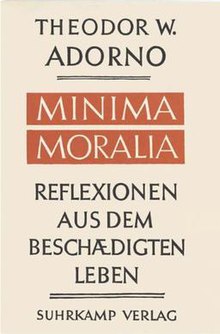Minima Moralia

Cover of the German edition
|
|
| Author | Theodor W. Adorno |
|---|---|
| Original title | Minima Moralia: Reflexionen aus dem beschädigten Leben |
| Country | Germany |
| Language | German |
| Subject | Philosophy |
| Published | 1951 |
| Media type | |
Minima Moralia: Reflections From Damaged Life (German: Minima Moralia: Reflexionen aus dem beschädigten Leben) is a 1951 book by Theodor W. Adorno and a seminal text in Critical Theory. Adorno started writing it during World War II, in 1944, while he lived as an exile in America, and completed it in 1949. It was originally written for the fiftieth birthday of his friend and collaborator Max Horkheimer, who had co-authored the earlier book Dialectic of Enlightenment with Adorno.
The book takes its title from Magna Moralia, a work on ethics that was traditionally attributed to Aristotle, though modern scholarly consensus attributes it to a later, though sympathetic, writer. As Adorno writes in the Dedication, the "sorrowful science" (a pun on Nietzsche's The Gay Science) with which the book is concerned is "the teaching of the good life", a central theme of both the Greek and Hebrew sources of Western philosophy. In the mid-20th century, Adorno maintains that a good, honest life is no longer possible, because we live in an inhuman society. "Life does not live", declares the book's opening epigram. Adorno illustrates this in a series of short reflections and aphorisms into which the book is broken, moving from everyday experiences to disturbing insights on general tendencies of late industrial society. Topics considered include the subversive nature of toys, the desolation of the family, the ungenuinness of being genuine, the decay of conversation, the rise of occultism, and the history of tact. Adorno shows how the smallest changes in everyday behavior stand in relation to the most catastrophic events of the twentieth century.
The book acknowledges its roots in the "damaged life" of its author, one of many intellectuals driven into exile by fascism, who, according to Adorno, are "mutilated without exception". But as one of its aphorisms reads, "The splinter in your eye is the best magnifying glass." So, as splinters left over from the smashed mirror of philosophy, the book's fragments try to illuminate clues as to humanity's descent into inhumanity in their immediate surroundings. A kind of post-philosophy working against the "untrue whole" of philosophy proper, Minima Moralia holds fast to the Judeo-Christian-Enlightenment vision of redemption, which it calls the only valid viewpoint with which to engage a deeply troubled world. By bringing the "Messianic light" of criticism on a landscape of consummate negativity, Adorno attempts to "project negatively an image of utopia."
...
Wikipedia
